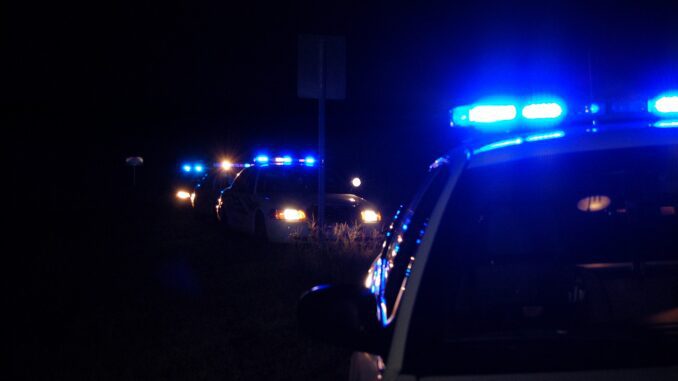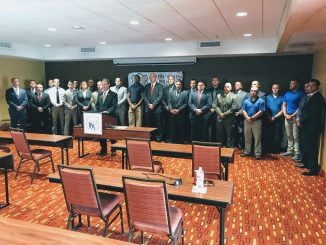
The Raleigh police officer cut me off mid-sentence.
“Lewis and…,” he said, giving me the name of the street I live on. “Right?”
I nodded. So did he.
“I heard that call go out last night,” he said. “We had a lot of people headed your way.”
I was standing in front of the North Raleigh police station discussing the incident that took place at our house the night before. My son, Jathan, is a member of Sanderson High’s Air Force JROTC program and drill team.
He’d been practicing with a mop, but his advisors suggested he get a dummy rifle, so it would be the same weight, size and shape as what they used in drill.
It arrived Tuesday — a rifle-shaped hunk of wood with a few pieces of metal simulating the trigger and chamber, looking more like a musket than an assault weapon. He went out after dinner to practice the 30-step drill he’s trying to perfect.
Within 10 minutes, the police pulled up at our house.
At this point, I should probably stop the narrative to point out a couple pieces of background information: I am white. Two and a half years ago, I married Jathan’s mother, who, like all three of her kids, is black.
Later, we listened to the 911 call. A neighbor described Jathan as “a tall, bald African-American man, carrying a rifle with a strap. He’s standing in the middle of the road, talking to himself.”
Our street dead ends in a cul de sac. There are no sidewalks, meaning the only place to walk is in the road. And Jathan was calling out the 30 steps, not “talking to himself.”
The description, however, paints a very different picture. Tall black man, rifle, standing in the middle of the road, talking to himself — it sounds like someone unhinged, with serious mental problems, about to go on a rampage.
Thankfully, this story doesn’t end in tragedy. In addition to ROTC, Jathan is in Raleigh Police Explorers and has done role-play training with police in traffic stops and approaching suspects. He knew just what to do.
He set down his rifle, took several steps away from it and kept his empty hands visible. He identified himself as an ROTC member and an Explorer. To their credit, the responding officers quickly surmised that the situation was not as described over the phone.
At first, I was furious with the unidentified neighbor. After hearing stories of what’s happened with blacks and police, how could someone choose those words and phrases, almost hand-picked to guarantee an aggressive police response?
When I tweeted the story and news outlets began reporting it, commenters ripped the caller, calling her racist, hateful, “Karen,” even evil.
In addition to ROTC, Jathan is in Raleigh Police Explorers and has done role-play training with police in traffic stops and approaching suspects. He knew just what to do.
Here’s the thing: After going back and forth on it over several sleepless nights, I’ve come to the conclusion that, when our neighbor called 911 the other night, she wasn’t calling in a hit on Jathan. She wasn’t acting out of mean-spirited racist hate.
She was describing what she saw.
And that’s a problem that’s even more upsetting, deeper, and much harder to fix.
After dinner, she went to her window and, when she looked at my son, she saw a large black man, with a rifle, standing in the middle of the road, talking to himself.
She sounds scared on that 911 call, and the operator tries calming her, telling her to lock her doors. At one point, she’s panicked, because her dogs are barking … as if that will cause the maniac outside to target her house first.
She looked at my son and feared for her life.
It’s easy to point out the bad guy — the racist, the supremacist, the person motivated by hate. The bad apple. Unfortunately, most of the bad things that happen aren’t the fault of people like that.
The Karen videos on social media, the cop who grabs a gun instead of a taser, the neighbor who tells a 911 operator, “He looks like he might come into my yard,” they are people just like all of us, who, in a moment, due to some type of bias or innate reaction, can’t see what’s really there, and they’re afraid.
My son, and people who look like him need to worry that things like this can happen to them at any time, even when they’re right in front of their home. And that will only change when the rest of us realize that things like this can happen to us too — before we’re dialing the phone.



